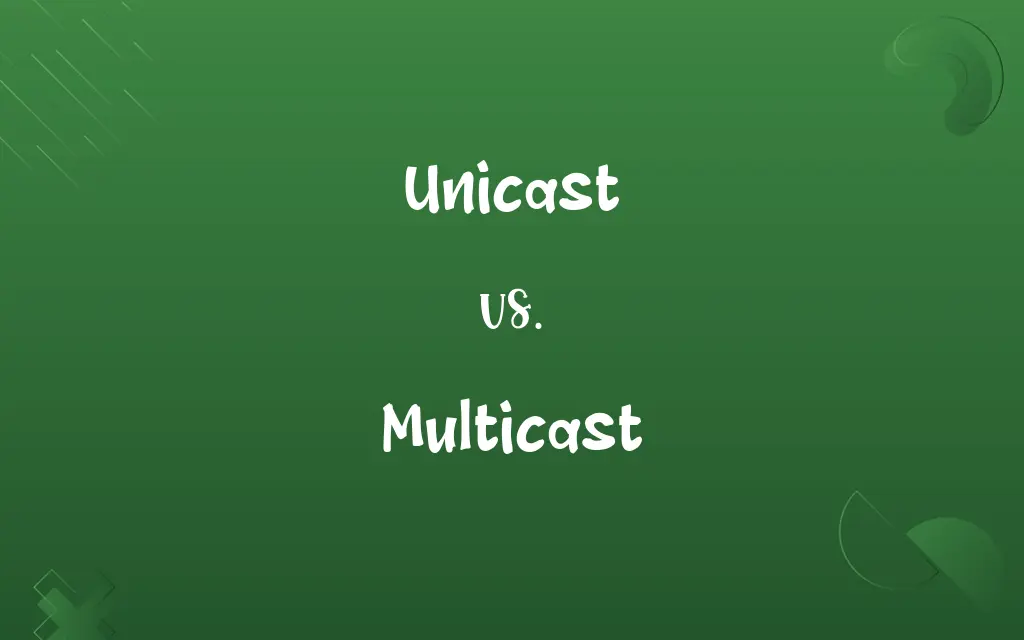Unicast vs. Multicast: Know the Difference
Unicast is one-to-one communication; Multicast is one-to-many communication.

Key Differences
Unicast refers to a communication protocol in computer networking where information is sent from one sender to one receiver. This is a point-to-point connection, typical in most standard internet communications. Unicast is like a phone call, where one person dials another and they have a two-way conversation.
Multicast, in contrast, is a communication method where information is sent from one sender to multiple receivers. This is a one-to-many relationship, used in scenarios like live TV streaming over the internet. Multicast is akin to a radio broadcast, where one station transmits and many people can tune in to listen.
Unicast transmissions are designed for specific, individual destinations identified by unique addresses. This specificity ensures that data packets reach only the intended recipient. In the internet world, this is like sending an email to a specific person.
Multicast, on the other hand, sends data to a group of destinations simultaneously. This group-oriented approach makes it efficient for applications like video conferencing, where the same data needs to reach multiple recipients. It's like sending a newsletter to a list of subscribers.
Unicast traffic can increase network load significantly as the number of recipients increases, since separate copies of data are sent to each recipient. This can lead to bandwidth inefficiency in large-scale applications.
ADVERTISEMENT
In contrast, Multicast is more bandwidth-efficient for large-scale applications. It reduces the network load by delivering a single stream of data to multiple users, thereby optimizing the use of network resources.
Comparison Chart
Communication Type
One-to-one
One-to-many
Network Load
Increases with more recipients
More efficient for large audiences
Typical Use
Email, File transfer
Live streaming, Webcasts
Addressing
Specific individual addresses
Group addresses
ADVERTISEMENT
Efficiency
Less efficient for mass communication
More efficient for simultaneous delivery
Unicast and Multicast Definitions
Unicast
Unicast is a network communication where data is sent from one sender to one specific receiver.
Sending an email to a colleague is a form of unicast communication.
Multicast
Multicast is used for efficient delivery of data over a network to multiple recipients.
Internet Protocol Television (IPTV) relies on multicast for distributing TV channels.
Unicast
Unicast communication is characterized by direct and exclusive two-way communication.
Accessing a webpage involves unicast communication between your computer and the web server.
Multicast
Multicast refers to network communication where data is transmitted from one sender to multiple receivers.
A live webinar broadcast is an example of multicast communication.
ADVERTISEMENT
Unicast
In unicast, a single packet is sent from the source to a single destination.
A video call between two individuals employs unicast transmission.
Multicast
Multicast communication utilizes group addressing.
Corporate video conferences often use multicast to connect with multiple employees.
Unicast
Unicast uses point-to-point network topology.
Remote desktop sessions use unicast to connect two computers directly.
Multicast
In multicast, packets are delivered to a group of destinations simultaneously.
Streaming a live sports event online uses multicast to reach various viewers at once.
Unicast
In unicast, the sender and receiver have a one-on-one connection.
File transfer using FTP is a unicast operation, with a direct link between the host and the client.
Multicast
Multicast is optimal for applications like video conferencing and live streaming.
Broadcasting a live concert online to various viewers globally is facilitated through multicast.
Unicast
Being the transmission of messages to a single destination host on a packet switching network.
Multicast
Having multiple targets, such that a call to the delegate triggers a call to each target.
Building .NET Applications with C#
Unicast
(programming) singlecast
Multicast
The simultaneous transmission of data to several destinations on a network.
Unicast
To transmit in this manner.
Repeatedly Asked Queries
When is Multicast used?
Multicast is used for broadcasting data to multiple recipients, like in live streaming.
Is Unicast efficient for large-scale communication?
No, it becomes inefficient as it requires separate connections for each recipient.
Is Multicast bandwidth efficient?
Yes, it is more bandwidth-efficient for large-scale broadcasts.
What is Multicast?
Multicast is a one-to-many network communication method.
Can Unicast address multiple recipients?
No, it is meant for a single, specific recipient.
Are there any specific protocols for Multicast?
Yes, protocols like IGMP are designed for multicast networking.
What is Unicast?
Unicast is a one-to-one network communication method.
Does Unicast support live streaming?
Unicast can support streaming, but it's not efficient for large audiences.
When is Unicast used?
Unicast is used for direct, point-to-point communication like sending an email.
What is an example of Unicast communication?
Sending a file to a specific person using FTP is an example.
Does Multicast require a group address?
Yes, it uses group addresses to communicate with multiple recipients.
Is Unicast secure?
Yes, it's generally more secure due to its one-to-one nature.
How does Multicast optimize network resources?
It sends a single data stream to multiple recipients, reducing redundancy.
What topology does Unicast use?
Unicast typically uses a point-to-point topology.
How do routers handle Multicast traffic?
Routers distribute multicast traffic to all members of a designated group.
What is an example of Multicast communication?
Broadcasting a live sports event to various online viewers is an example.
How do routers handle Unicast traffic?
Routers direct unicast traffic specifically to the intended recipient's address.
What topology does Multicast use?
Multicast uses a point-to-multipoint topology.
Can Unicast and Multicast coexist in a network?
Yes, they can coexist and serve different purposes in the same network.
Is Multicast suitable for confidential communications?
Not typically, as it's meant for broad, non-exclusive broadcasts.
Share this page
Link for your blog / website
HTML
Link to share via messenger









































































